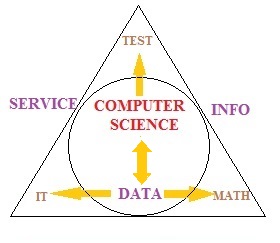Software Engineering and Design
Homework Help & Tutoring
We offer an array of different online Software Engineering and Design tutors, all of whom are advanced in their fields and highly qualified to instruct you.
Software Engineering and Design
During the last half century there has been some debate about whether or not areas of computer science should be considered one of the engineering disciplines. Certain experts in software development, design, and application feel that they deserve to be called "software engineers." By now, most people accept the field of software engineering as a legitimate engineering discipline.
Although software engineering is a young field compared to other engineering disciplines such as chemical, electrical, or mechanical, it already has an exciting history full of valuable lessons derived from its early successes and failures. Software engineering covers a huge variety of topics originating both in computer science (such as development processes and methodologies, testing, and refactoring) and social science (such as software estimation metrics and techniques, risk management, and quality assurance). Everyone working with software, to one extent or another, can benefit from studying the history and fundamentals of software engineering.
A typical software engineering course may involve any combination of the following topics:
- Traditional software development processes and methodologies (Waterfall, UP, RUP, etc.)
- Modern software development processes and methodologies (XP, SCRUM, etc.)
- Software development life cycle (SDLC) models
- Requirements gathering
- Initial (abstract) and detailed system analysis
- Initial (abstract) and detailed system design
- Testing methodologies (unit, white-box/black-box, integration, user acceptance, Interface, test-driven Development, etc.)
- Software maintenance and refactoring
- Software architectures and paradigms (2/3/N-Tier Systems, client-server model, P2P Model, distributed computing, Service Oriented Architectures (SOAs), RESTful Paradigm, SOAP Paradigm, WS-* Standards, Cloud Computing, Software as a Service (SaaS), Platform as a Service (PaaS), etc.)
- Project management
- Software metrics and estimation techniques
- Risk management (Planning and Mitigation)
- Software quality assurance
Software engineering has grown significantly and now encompasses a very diverse set of topics. Pressman's Software Engineering: A Practitioner's Approach is considered the best introductory book for computer science students along with Sommerville's classic Software Engineering. Frederick Brooks' The Mythical Man-Month is probably the most cited book in the field, detailing how the process of software development can go awfully wrong and stating for the first time that throwing more people on an ongoing project is far more likely to delay it! Code Complete by Steve McConnell and The Pragmatic Programmer by Andrew Hunt are a "must read" for anyone wanting to dive deeper, as is the Design Patterns: Elements of Reusable Object-Oriented Software, written by the famous "Gang of Four" (Erich Gamma, Richard Helm, Ralph Johnson, and John M. Vlissides), which changed forever the way software is developed. Finally, don't miss Joel Spolsky's blog and books, the definitive voice on modern topics of software engineering (or, "what you won't learn from your SE textbook"). For academic resources you should look into conference proceedings and journals published by the ACM, IEEE, Springer, Elsevier, Google Scholar, and CMU's Software Engineering Institute.
Agile Development Methodology
To fulfill our tutoring mission of online education, our college homework help and online tutoring centers are standing by 24/7, ready to assist college students who need homework help with all aspects of software engineering and design. Our computer science tutors can help with all your projects, large or small, and we challenge you to find better online software engineering and design tutoring anywhere.
College Software Engineering and Design Homework Help
Since we have tutors in all Software Engineering and Design related topics, we can provide a range of different services. Our online Software Engineering and Design tutors will:
- Provide specific insight for homework assignments.
- Review broad conceptual ideas and chapters.
- Simplify complex topics into digestible pieces of information.
- Answer any Software Engineering and Design related questions.
- Tailor instruction to fit your style of learning.
With these capabilities, our college Software Engineering and Design tutors will give you the tools you need to gain a comprehensive knowledge of Software Engineering and Design you can use in future courses.
24HourAnswers Online Software Engineering and Design Tutors
Our tutors are just as dedicated to your success in class as you are, so they are available around the clock to assist you with questions, homework, exam preparation and any Software Engineering and Design related assignments you need extra help completing.
In addition to gaining access to highly qualified tutors, you'll also strengthen your confidence level in the classroom when you work with us. This newfound confidence will allow you to apply your Software Engineering and Design knowledge in future courses and keep your education progressing smoothly.
Because our college Software Engineering and Design tutors are fully remote, seeking their help is easy. Rather than spend valuable time trying to find a local Software Engineering and Design tutor you can trust, just call on our tutors whenever you need them without any conflicting schedules getting in the way.






